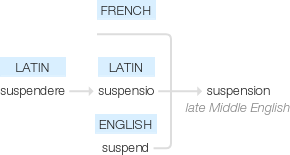Suspension
late Middle English: from French, or from Latin suspensio(n- ), from the verb suspendere (see suspend).
wiktionary
From Late Latin suspensiō, suspensiōnem(“ arching, vaulting; suspension”), from suspendēre, from suspendō(“to hang up, to suspend”), from sub-(“prefix meaning ‘ under’”) + pendere (from pendō(“to hang, to suspend”), from Proto-Italic *pendō(“to hang, to put in a hanging position”), from Proto-Indo-European *(s)pénd-e-ti, from *(s)pend-(“to pull; to spin”)). Compare Anglo-Norman suspensiun, French suspension, Occitan suspensio.
etymonline
suspension (n.)
early 15c., "a temporary halting or deprivation," from Latin suspensionem (nominative suspensio) "the act or state of hanging up, a vaulting," noun of action, from past-participle stem of suspendere "to hang up, cause to hang, suspend," from assimilated form of sub "up from under" (see sub-) + pendere "to hang, cause to hang; weigh" (from PIE root *(s)pen- "to draw, stretch, spin"). Suspension of disbelief is from Coleridge:
A semblance of truth sufficient to procure for these shadows of imagination that willing suspension of disbelief for the moment, which constitutes poetic faith. ["Biographia Literaria," 1817]
Meaning "action of hanging by a support from above" is attested from 1540s. Meaning "particles suspended in liquid without dissolving" is from 1707. Suspension-bridge is recorded by 1819 (earlier suspended bridge, 1796).
